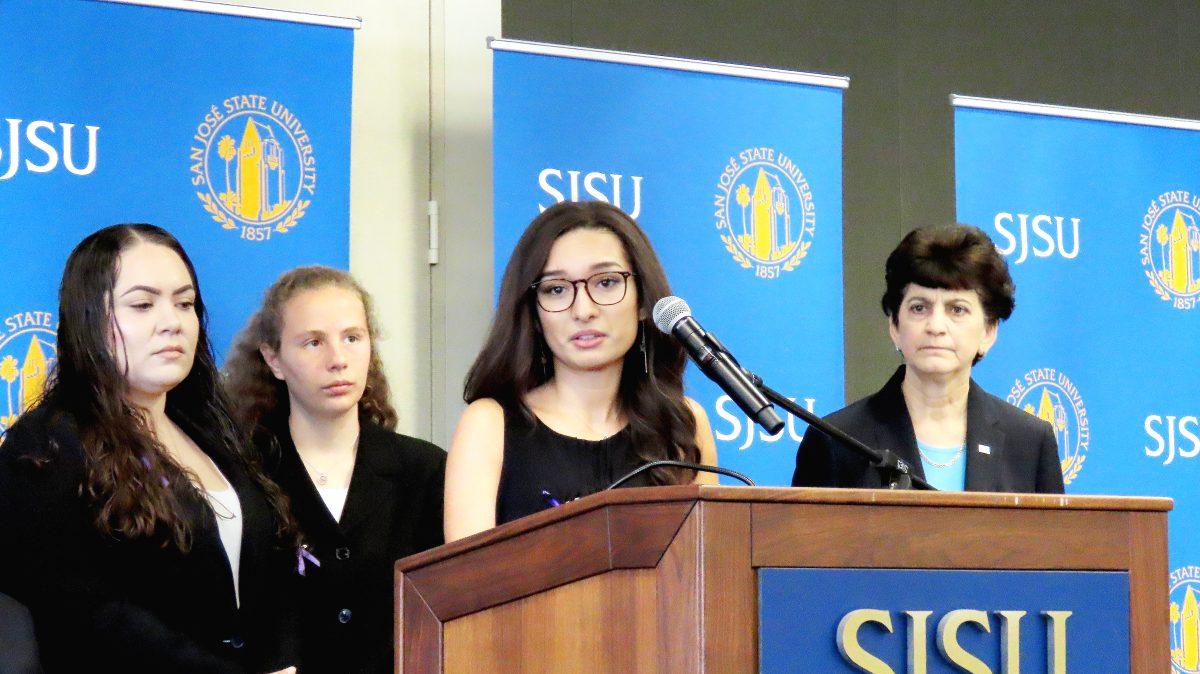
From left to right: Student Homeless Alliance members Lana Gomez, Diana Rendler and Briena Brown answer questions about housing solutions during a Jan. 27 news conference. Christian Trujano | Spartan Daily Archives
Olivia Gerber contributed reporting to this article.
Registering to vote is at the forefront of most people’s minds during this election season.
But for homeless San Jose State students and community members, it is the least of their concerns.
Homeless students are too focused on getting basic necessities, like food and shelter, to worry about their voter registration, said Lana Gomez, a sociology senior and representative of the Student Homeless Alliance, a student-led organization that advocates for unhoused SJSU students.
“When (homeless students) are trying to figure out, ‘What am I going to eat today? Where
am I going to sleep?’ . . . Voting falls to the side,” Gomez said.
She said voting isn’t a priority for some homeless students when they are “struggling to make ends meet.”
Briena Brown, a sociology senior and president of the alliance, said that the organization is focusing more on providing students with resources for their basic needs rather than resources to vote.
“We don’t have a plan created on how to get [homeless students] to vote because most students in crisis don’t have the ability to prioritize anything but survival,” Brown said.
A 2018 California State University study on students’ basic needs showed that over 4,300 SJSU students experienced homeless. They are a part of the 9,700 homeless people living in Santa Clara County, according to a 2019 census report.
A third-year music major at SJSU who has been facing homelessnes since the start of this academic year said she had to take extra steps to get her ballot from a previous residence so she could vote.
She requested to be kept anonymous to protect her privacy and will be referred to as Julie.
“I don’t think people understand that having somewhere to live is actually super important with voting. It makes it easier to receive your ballot in the mail and turn it back in,” she said.
Julie explained that it’s crucial for people facing homelessness to vote even with so much to worry about with day-to-day challenges.
“It’s important for people facing homelessness to be able to vote in the election, especially in San Jose because that’s a lot of people,” she said.
Pastor Scott Wager, an SJSU class of 1994 alumnus and founder of the Alliance, said over the phone that people living in stable homes can’t expect homeless people to prioritize voting when their survival is at stake.
“You can’t project [the values and priorities of people who are] housed on those who are unhoused,” Wager said. “[Homeless people’s] world is all about survival . . . competing with other [people and animals] for basic substance.”
Wager serves as a senior pastor and is the founder of CHAM Deliverance Ministry, a service that provides meals and shelter to homeless people and families in Silicon Valley.
Sandy Perry, president of the Affordable Housing Network of Santa Clara County, a movement dedicated to increasing affordable housing in the county, said that in addition to homeless people getting into a “survival mode” there are many overall barriers that prevent them from voting.
According to the Santa Clara County’s Registrar of Voters website, a home address is required in order to determine a person’s voting district. Although this can inconvenience those without homes, they can still register to vote by providing a specific description of a location where they spend most of their time.
“It is extremely difficult for homeless people to vote, but it’s not impossible,” Perry said.
Perry said another barrier is that homeless people don’t have a valid form of identification, such as a license, to register to vote. Although they can use a location, like a homeless shelter, as their mailing address, there is no guarantee that they will stay in one place long enough to receive election material such as their ballots.
Despite these barriers, Perry said that he has seen homeless people express interest in voting during the 2018 elections.
“[This homeless woman] listened to the radio all the time and was very up-to-date on all the propositions,” Perry said. “She wanted to make sure she got her vote in.”
Perry said, however, that the woman was unable to get her forms in on time and wasn’t able to vote.
Wager said the difficulties homeless people face when voting is another reminder of how the county neglects its homeless population.
“Voting is important for the unhoused,” Wager said. “But they are so margined that they don’t even have a voice.”